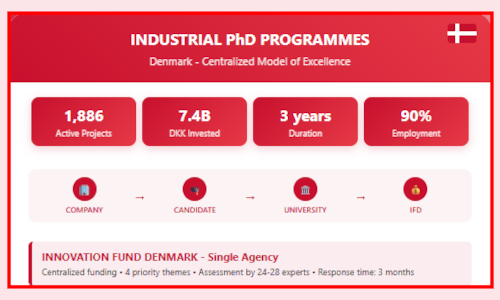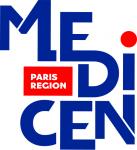Industrial PhD Programmes in Denmark
19/09/2025
A Centralized Model of Excellence and Innovation
Denmark has forged an outstanding reputation in university-industry collaboration through its Industrial PhD Programme, centrally administered by Innovation Fund Denmark. This unique system, established since 1971 and refined in 1988, represents today one of the most accomplished models of doctoral training oriented toward innovation and economic value creation.

The Danish Doctoral System: A Centralized Architecture
Architecture of the Dannish Industrial PhD Programme
Eligibility Conditions and Modalities
By Tania Suvorova
The Danish Doctoral System: A Centralized Architecture
The Danish doctoral system is distinguished by its centralization around Innovation Fund Denmark (IFD), an independent public body created in 2014 that unifies industrial research funding. This coordinated approach enables optimal resource allocation and ensures homogeneous programme quality across the country.
With over 1,886 active projects and a budget of 7.4 billion DKK in ongoing investments, Innovation Fund Denmark constitutes the main driver of Danish industrial doctorate development. The system is characterized by a tripartite approach systematically involving the company, university, and industrial PhD candidate.
Architecture of the Danish Industrial PhD Programme
1. The Danish Doctoral System: A Centralized Architecture
Innovation Fund Denmark constitutes the unique entry point for industrial PhD funding in Denmark. Created in April 2014, this fund invests in entrepreneurs, scientists, and companies with ideas capable of solving societal challenges.
Mission and Objectives:
- Strengthening university-industry collaboration
- Promoting research with commercial perspectives
- Exploiting competencies and research facilities
- Increasing the number of PhDs in the Danish economy
Funding Structure:
- Company: 712,000 DKK (612,000 DKK salary contribution + 100,000 DKK travel/training)
- University: 360,000 DKK (overhead included)
- Monthly subsidy: Up to 17,000 DKK per month (maximum 50% of student salary)
- Duration: Exactly 3 years
2. Priority Areas and Thematic Calls
Innovation Fund Denmark directs its investments according to four political priority themes:
Priority Themes 2024-2025:
- Green technology and innovation - Sustainable solutions and energy transition
- Life science, health and welfare technology - Biotechnology, medical devices, digital health
- Critical and digital technologies - Artificial intelligence, cybersecurity, quantum technologies
- Projects outside themes - Innovation in all sectors not covered
Strategic Green Missions (311.1 million DKK in 2025):
- CO₂ capture and storage/utilization (CCUS)
- Green fuels for transport and industry (Power-to-X)
- Climate and environmentally friendly agriculture and food production
- Circular economy (plastics and textiles)
3. Main Partner Universities
Technical University of Denmark (DTU)
- Positioning: Leading European technical university (107th in QS World Rankings 2026)
- Specialization: Engineering, natural sciences, sustainable technological development
- Staff: 1,453 PhD students with 44% international students at master level
- Employability rate: 85% of graduates find employment within 6 months
- Campus: Lyngby (Copenhagen suburb), 106 hectares, 500 million EUR ongoing investment
University of Copenhagen (UCPH)
- Faculty of Science: Main partner for industrial PhDs
- Process: Candidate finds Danish company + company supervisor ⇒ UCPH Science supervisor ⇒ IFD application ⇒ doctoral school admission
- Particularities: No teaching obligation, mandatory specific "Industrial PhD" course
Aarhus University (AU)
Specialized contacts:
Faculty of Arts: Anna Louise Dolan Plaskett (plaskett@au.dk)
Faculty of Natural Sciences: Frederikke Kongsted Hansen (fkh@au.dk), Mie Meulengracht Christensen (mime@au.dk)
Training Centre: Centre for Educational Development manages mandatory IFD course
University of Southern Denmark (SDU)
- Approach: Triangular collaboration company-candidate-SDU
- Focus: Business-oriented projects with direct practical application
Eligibility Conditions and Modalities
For Candidates
Required degree: Master's with minimum 10/20 on thesis AND either:
- Minimum 8.2 average on bachelor + master combined
- Minimum 9.5 average on master alone
- Exemption possibilities according to current guidelines
Language skills: Excellent English level required, Danish depending on subject
For Companies
Location: Headquarters or geographical division in Denmark (2024 extension: Greenland and Faroe Islands) Required capabilities:
- Funding and facilities to conduct the project
- Qualified industrial supervisor
- 3-year commitment
- Ability to employ the PhD student
For Universities
Status: University officially authorized to award PhDs Commitment: Ability to assign a supervisor to the project Responsibilities:
- Academic supervision of the PhD student
- Access to university facilities (equipment, materials, apparatus)
- Participation in relevant PhD courses
- PhD thesis assessment
- Results dissemination and thesis printing
2025 Calendar and Application Procedures
Main Innovation Fund Denmark Deadlines
Industrial Researcher (PhD and Postdoc):
- Spring 2025: Opens February 22 - Deadline April 4, 2025
- Autumn 2025: Opens August 1 - Deadline September 12, 2025
- Public sector: Deadline October 2025
Other Complementary Programmes:
- Innobooster: Reopening March 4, 2025 (improved version)
- Innoexplorer: September 24, 2025 (Round 3)
- Grand Solutions: Phase 1 (mid-January - March 19), Phase 2 (May 23 - August 19)
Impact and Perspectives
The Danish industrial PhD programme remarkably illustrates the effectiveness of a centralized and systematic approach to university-industry collaboration. With over 1,200 projects evaluated since its inception and measurable results in terms of innovation, patents, and employment, this model demonstrates its relevance for the national innovation ecosystem.
Denmark's unique architecture, centered on Innovation Fund Denmark, ensures consistency, quality, and impact while maintaining the flexibility necessary for adaptation to specific sectoral needs. This approach makes Denmark a global reference in industrial doctoral training and knowledge transfer.
This article was written by ABG - Association Bernard Gregory, specialist in PhD career development since 1980.
Sources:
Get ABG’s monthly newsletters including news, job offers, grants & fellowships and a selection of relevant events…
Discover our members
 Laboratoire National de Métrologie et d'Essais - LNE
Laboratoire National de Métrologie et d'Essais - LNE  Medicen Paris Region
Medicen Paris Region  Tecknowmetrix
Tecknowmetrix  ONERA - The French Aerospace Lab
ONERA - The French Aerospace Lab  Ifremer
Ifremer  Généthon
Généthon  Institut Sup'biotech de Paris
Institut Sup'biotech de Paris  Servier
Servier  SUEZ
SUEZ  Groupe AFNOR - Association française de normalisation
Groupe AFNOR - Association française de normalisation  ADEME
ADEME  TotalEnergies
TotalEnergies  Nokia Bell Labs France
Nokia Bell Labs France  ANRT
ANRT  Nantes Université
Nantes Université  ASNR - Autorité de sûreté nucléaire et de radioprotection - Siège
ASNR - Autorité de sûreté nucléaire et de radioprotection - Siège  Aérocentre, Pôle d'excellence régional
Aérocentre, Pôle d'excellence régional
